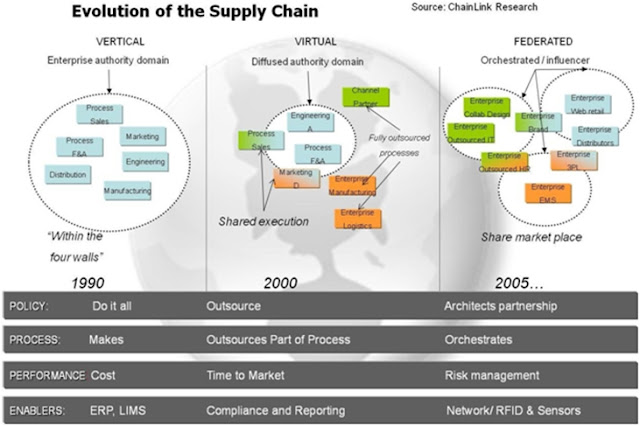
15 Key Innovations in supply chain strategy: Ford Assembly line, EDI, MRP, ERP, Dell Direct, Walmart Cross Docking
The 1950s - Ocean Shipping Container: Malcolm McLean invented the standard steel shipping container first implemented in 1956 at the port of New Jersey.
The 1960s – Electronic Data Interchange (EDI) – Started when computer systems first had the capability to transfer data to other computer systems. Enables the exchange of electronic business documents.
1961- Material Resource Planning (MRP) – Josef Orlicky makes the first MRP system in Racine, Wisconsin. A year later, Gene Thomas from IBM invents the Bill of Materials Processor.
1990: Universal Product Code (UPC) – a company called Logicon wrote a standard for something close to what became known as the Universal Product Code (UPC) to identify via a barcode a specific SKU. The first implementation of the UPC was in 1974 at a Marsh's supermarket in Troy, OH.
The 1980s – Enterprise Resource Planning – In 1990, Gartner Group first employed the acronym ERP which came to represent a larger whole, reflecting the evolution of application integration beyond manufacturing.
1984 – Dell Direct Orders – Michael Dell started his company in his dorm room shipping computers to customers. This developed a unique model of make to order that provided custom configurations to customers and shipped to them.
1985 – FedEx Tracking System – After re-inventing the category of express parcel shipments, FedEx went a step further by developing a new computerized tracking system that provided near real-time information about package delivery.
1987- P&G's Continuous Replenishment: Order patterns were totally dependent on sales and retail buyer input until P&G bought a mainframe application from IBM for "continuous replenishment" re-wrote it for retail,
1988 – Walmart Cross Docking – With the rapid expansion in the number of Walmart stores, the company needed an effective communication system. They introduced the first cross docking system, which enabled them to track goods across all their DCs and stores
Source: opsrules





0 comments:
Post a Comment